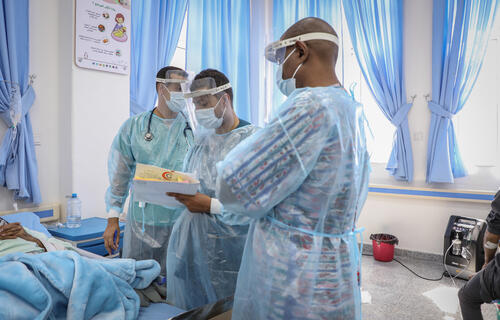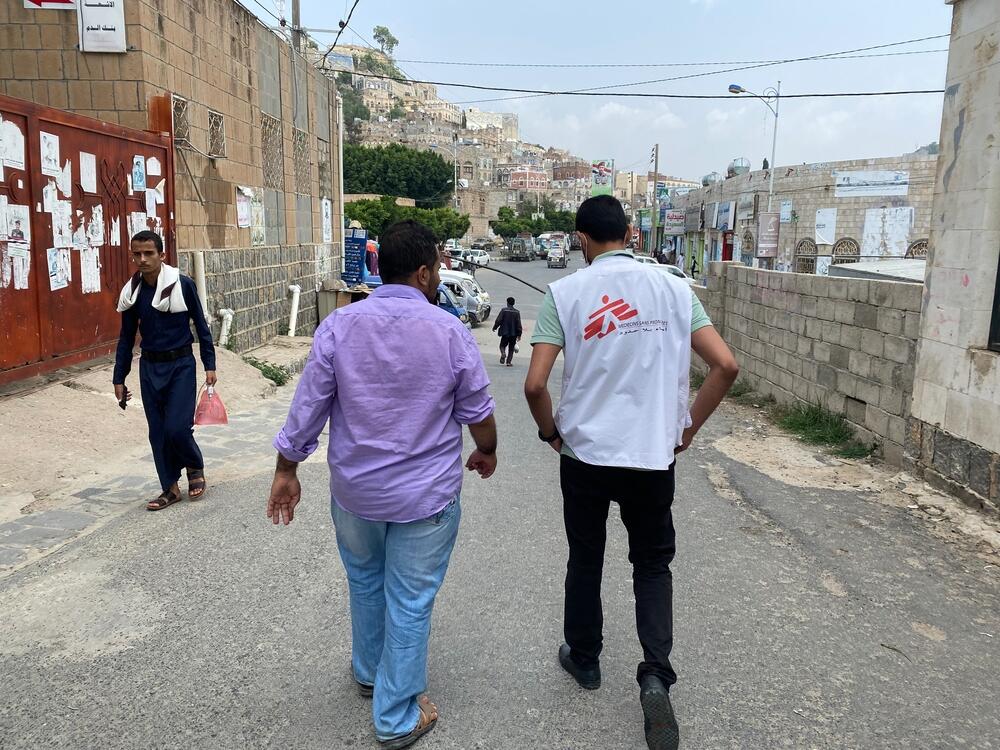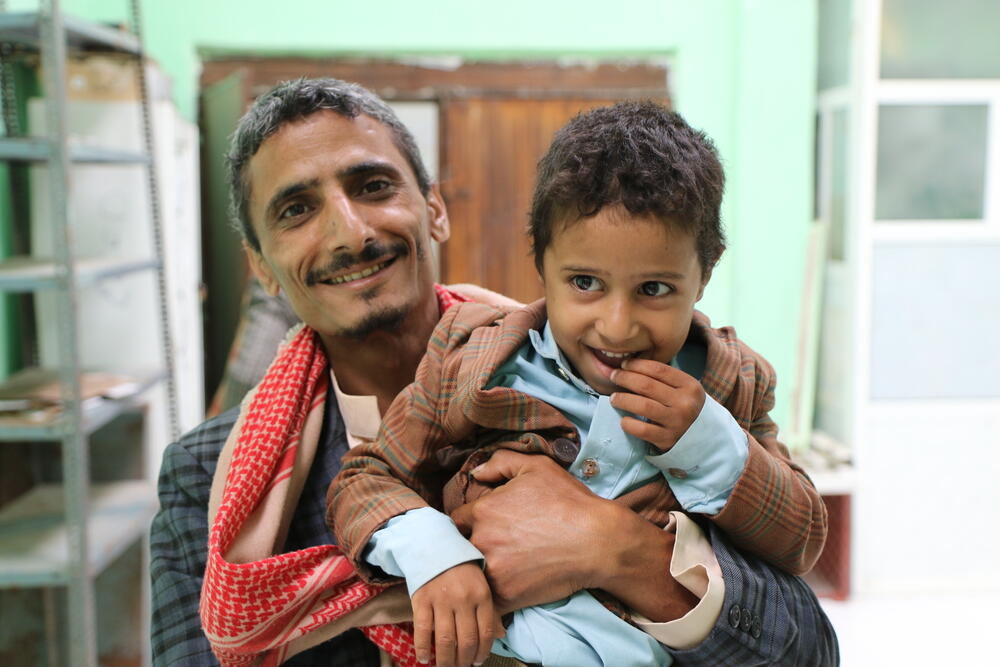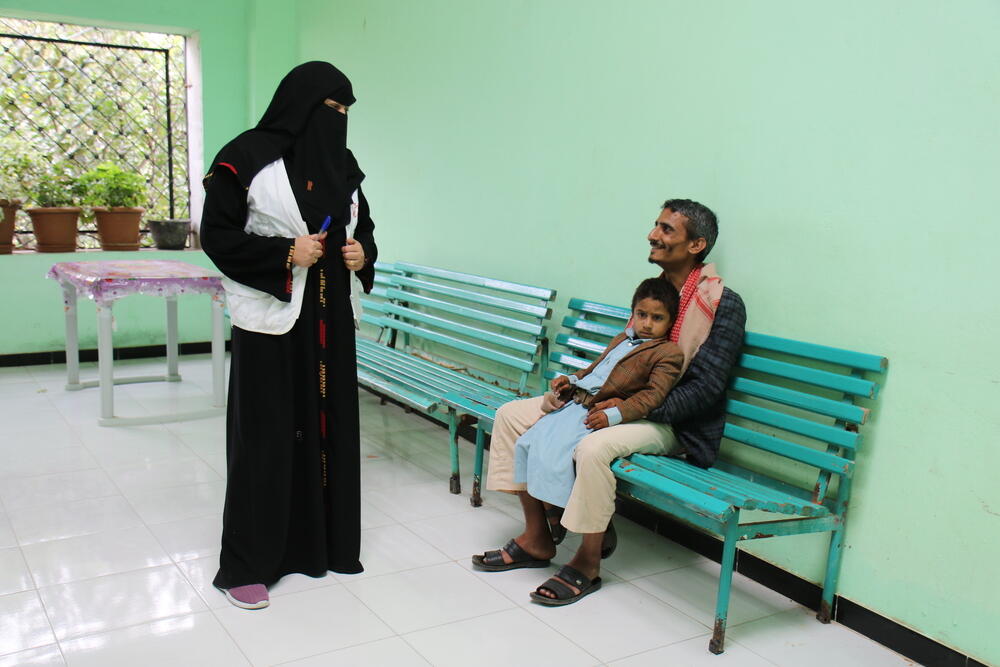Mental health in Yemen: “The number of severe cases is astonishingly high”
Compared to the early days of the conflict in Yemen, Médecins Sans Frontières / Doctors Without Borders (MSF) teams in Hajjah are seeing fewer casualties from violence.
But, well into its seventh year, the war certainly isn’t over. The conflict is having a disastrous impact on people’s wellbeing and mental health.
Antonella Pozzi is MSF’s mental health activity manager in the MSF-supported Al-Gamhouri hospital, where we provide specialised mental health services. She shares her story:
“The range of conditions that we treat is large; there are people suffering from anxiety and insomnia, and then we see patients presenting with severe pathologies such as psychosis, depression, bipolar disorder and post-traumatic stress disorder (PTSD). In our service, we regularly see patients following suicide attempts.
Mental wellbeing is very much affected by external factors. The more intense someone’s circumstances are, the more their wellbeing will be impacted. Living in the context of war means being exposed to constant stress for a long period of time.
Armed conflict in Yemen has not only affected people’s physical health: it has reduced their access to healthcare, education, and food, it restricts their freedom of movement and denies them the freedom to express themselves. This creates serious mental health disorders.
Patients with mental health issues in Yemen are no different to others experiencing conflict around the world. But 45 percent of the patients we see in the MSF mental health clinic are severe cases.

Help us prepare for the next emergency
The number of severe cases is astonishingly high, especially taking into account that worldwide, and even in conflict settings, the number of patients presenting severe mental health conditions should not exceed 5.1 percent of the total cases, as defined by the World Health Organization in 2019.
The scale of the crisis
Authorities have identified more than 9,000 patients in the Hajjah area who need mental health services. The actual number is probably even higher since mental health needs tend to be underestimated. People often come to our clinic from distances of more than 100km to access our services.
"Lack of awareness and stigma are two sides of the same coin. Lack of awareness leads to stigma, discrimination, and segregation, and this leads to people hiding their conditions, increasing their suffering and isolation."
Because of the war, the population in Hajjah is accustomed to high levels of violence. People here are very resilient and their tolerance to adverse circumstances is very high.
This means that they arrive at mental health consultations only if a mental health issue has become very obvious and disruptive to the patient and his loved ones.
For instance, a family might only become alarmed and seek help when a patient is at the point of becoming agitated or paranoid and is threatening to hurt others.
The war and the lack of mental health services in the area have increased the prevalence of these sorts of conditions. In March, June, and July (for example) of this year, more than half of new patients seeking help at the MSF clinic presented with severe mental health disorders.
Hamdan's story
Hamdan Saleh had worked happily in the administration department of the Yemeni security forces for years. But, at the start of the civil war in Yemen, he became one of the hundreds of government employees who had their salaries stopped.
His pay was the only source of income for his family. Their sudden financial difficulties, alongside the worsening conflict, led Hamdan to develop mental health issues.
Hamdan began to suffer from psychosis and feelings of paranoia.
“I started believing that everyone was conspiring against me, trying to harm me," he says.
"I had hallucinations too, hearing and seeing mystical creatures telling me to do things. Telling me to die.
"One day I poured gasoline on myself to set myself on fire. I changed my mind at the last moment by thinking of my children.”
With no knowledge or understanding of mental health care, Hamdan’s family turned to spiritual treatment. However, it did not work.
“Hamdan was referred to the MSF mental health clinic at Al-Gamhouri Hospital in 2019 after he had already suffered from the disorder for years,” says MSF psychologist Rasmia Mohammed Ali.
“He is another example of how the conflict has affected people’s lives economically and socially, leading to severe mental health issues.”
“While the lack of services for mental health care is a problem, people’s limited understanding of such conditions is also a challenge.
"There are patients who feel better once they start taking the right medication and so leave the treatment considering themselves fine. This could lead to relapse.
"Hamdan was one who struggled to consistently take his treatment, but he is now fully treated and discharged from the clinic.”
Hamdan is now a farmer back in his village. He grows corn and wheat.
He feels better, and his family and social life are back to normal. It has been a month since Hamdan last came to the mental health clinic with his son.
As he walked out of the clinic, Hamdan said he hoped he would never come back here again:
“I experienced some side effects of the treatment. But I had to take medicines to make myself better.
"If I had a choice, I would have never taken the medicines, but mental health disorders aren’t a choice.”
Vicious cycle of awareness and stigma
It is essential to try to help the population to understand what mental health conditions are, and how to recognise them. This would give patients and their families at least some of the tools to handle severe conditions.
In the case of psychotic patients presenting severe signs of agitation, the families often have to resort to chaining them, sometimes with fixed chains that patients wear for days or weeks, to deal with their crisis.
When asked about these methods, the families clearly explain that they do not know how to handle the patients in moments of severe aggressiveness and agitation, when they pose a danger to those around them, so they apply these measures.
Even If we empathise with the family’s need to control the symptoms, we have to take into account that these measures are extreme and in violation of basic human rights.
"Even if the conflict were to end tomorrow, what it has done to people’s psychological health will be seen and felt for many years to come"
This is one of the reasons why it is paramount to work on mental health awareness so that when they face these types of symptoms families know where to turn to for professional help.
Lack of awareness and stigma are two sides of the same coin. Lack of awareness leads to stigma, discrimination, and segregation, and this leads to people hiding their conditions, increasing their suffering and isolation.
This is particularly the case for women who are discouraged from sharing their feelings and from speaking up about their psychological struggles. In many cases, this leads to severe states of depression.
Long-term approaches needed
In our daily work at the MSF clinic in Hajjah, we try to normalise mental health issues and help change the social understandings and associations that link mental health conditions with things like “craziness” and “danger”.
These associations create stigma and suffering for mental health patients and their families. Norms do not change as fast as we would like, but it is our hope that if we keep committing to our work, the changes in our practices will have a direct impact on the way these notions are articulated within society, leading to a slow but hopefully sustainable change.
Even if the conflict were to end tomorrow, what it has done to people’s psychological health will be seen and felt for many years to come.
Yemen needs a long-term comprehensive approach including more services to address the looming mental health crisis.
If overlooked, mental health issues can turn into chronic problems on a larger scale, resulting in the isolation of those suffering from disorders. This can lead to further damage to the social fabric, which is already very weak.
It is our hope that through our collaborative work we can contribute to improving the mental health conditions of a population that has already had to face and overcome adversity at profoundly deep and devastating levels.”

Our work saves lives
MSF in Yemen
Yemen is in the midst of a civil war. Since March 2015, a Saudi and Emirati-led coalition has been fighting anti-government Ansar Allah forces, resulting in widespread destruction, bombing and gun battles.
Recent outbreaks of diseases and an upsurge in fighting have exacerbated the already dire humanitarian situation in Yemen. With an estimated 20 million in need of humanitarian assistance, our activities in Yemen are among our most extensive worldwide.
Médecins Sans Frontières / Doctors Without Borders (MSF) works in 12 hospitals and health centres across the country and provide support to more than 13 others in 13 governorates across the country.


